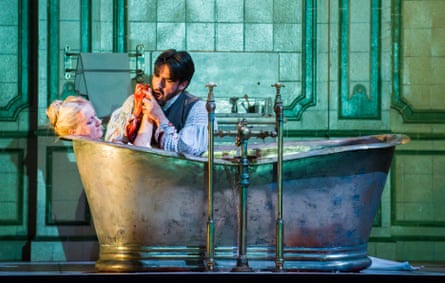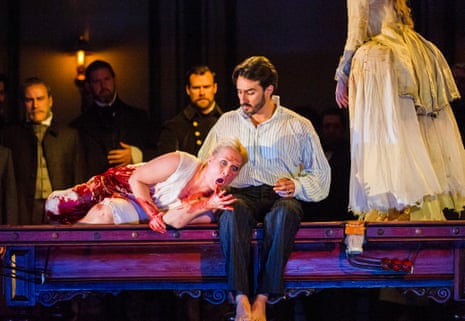Long before Royal Opera’s new Lucia di Lammermoor hove into sight, the advance party had announced its coming, not so much with a red flag as a bitonal ding-dong. “One woman’s fight for love and survival,” crooned the promos, with soft-focus artwork vaguely placing Donizetti’s 1835 bel canto tragedy in romantic fiction mode. “I have a strong feminist agenda,” announced its director, Katie Mitchell, in stark comparison, promising to put the emphasis on women even though it takes two, including a man, to get into Lucia’s kind of tangle. Warnings of sex and violence, crumpled crinolines or, worse, no crinoline at all provoked outcry and cancelled bookings.
To say that it failed to live up to expectation is a compliment as well as a relief. Full of provocative thought, whether you liked it or not, it did not deserve the predictable boos, let out like pre-prepared whoopee cushions, when Mitchell and her team took their bow. The cheers for the cast (the first of two) were long and loud. It wasn’t vintage singing but it had thrilling moments, led by Diana Damrau in the title role, with Charles Castronovo as her lover and eloquent contributions from Ludovic Tézier (burly and powerful as Enrico) and Kwangchul Youn (Raimondo). The action was no more explicit than plenty you see on the operatic stage. Despite endless undressing, no one ended up naked. The sex was suggestive rather than too literal, though if I see one more couple humping in time to the orchestra I will reach for a rosary. It’s the oldest cliche in the book. Please think of another.
Donizetti was in his prime with Lucia, his 46th opera, and hit the fashion for things Scottish by plundering Walter Scott’s The Bride of Lammermuir, a novel brimming with incident and a victimised gothic heroine. The Ashton family fortunes depend on Lucia making a good marriage. In Mitchell’s staging, Lucia is a grown woman, tardy in finding love. When she does, the result is explosive. Batten down the hatches. Her lover Edgardo is her brother’s enemy. Tricks and deceit persuade her of his faithlessness. Too late she sees the truth and loses her grip, with tragic consequences. Mitchell, whose tough production of Cleansed is running at the National Theatre, and her designer Vicki Mortimer have split the action, set around 1840, into two. It is neither more or less feminist than the original. It is certainly crazily busier. Simultaneously we see what is happening in the plot and what might also be going on had Donizetti thought it worth including.
The composer’s power, however, lies in expressing emotion through song. There is almost no orchestral writing that does not specifically support the vocal line: a solo harp or flute or cello or, in this opera, the mysterious glass harmonica. Out of meandering string accompaniments, solo voices rise and fall, having delivered the trills and roulades for which this repertoire is famous. It is all there in the score, conducted with a certain stolidity by Daniel Oren but played with animation by the ROH orchestra. It demands only that you watch, as well as listen to the singer. Lucia is one of Damrau’s signature roles. The “mad scene” makes almost incredible demands, of precision, detail, concentration. Damrau met them, despite some weakness at the stratospheric top. The audience watched, relieved that there was no grisly incident elsewhere to upstage her.

This was the production’s fatal flaw. Repeatedly the action listed from one side of the stage to the other, often hard to see depending on sightlines. The chorus – excellent, and with women dressed as men, presumably to underline Lucia’s male-dominated world – had to squeeze into tight corners. Worse, attention was drawn constantly to another part of the stage, tearing us from the singer, usually poor Castronovo, who has a powerful, alluring voice but had to battle with compulsive distractions: Lucia having a miscarriage or aborting, Lucia and her maid (Rachael Lloyd) trying to kill Arturo (Taylor Stayton), who flops and flaps like a dying fish begging for release. There was laughter and audible tsk-tsk-ing, instead of horror. For Castronovo to have to sing his last farewell against the sound of running water was an assault more abominable than any operatic sex or violence. Calmed down and simplified, with music restored to the fore, this could be a workable Lucia di Lammermoor. It holds attention and disturbs. It looks beautiful in Mortimer’s carefully observed interiors, naturalistically lit by Jon Clark. No tartan or loch or crag, just a stifling world of submission and oppression.
The same team was responsible for George Benjamin’s Written on Skin, back at the Royal Opera House in the 2016-17 season, announced last week. Music director Antonio Pappano has extended his contract to 2020. New productions include Thomas Adès’s The Exterminating Angel, Norma with Anna Netrebko and Otello with Jonas Kaufmann. Director Barrie Kosky will make his house debut with Shostakovich’s The Nose. Kosky, like Katie Mitchell and anyone with anything interesting to say, gets up some and puts others out of joint, but the prospect excites.

Comments (…)
Sign in or create your Guardian account to join the discussion